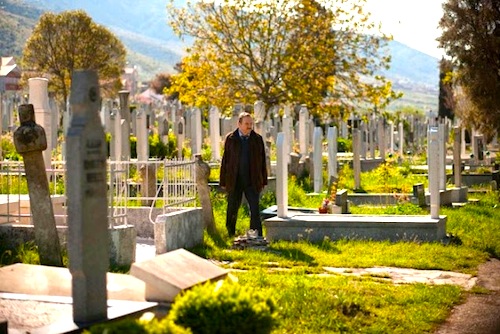By Joe Bendel. For cineastes, the notion of divided cities conjures images of The Third Man’s occupied Vienna. In contrast, there is nothing particularly mysterious about the effective religious-ethnic cleaving of Mostar. The bridge has been rebuilt but the distrust lingers between Muslim Bosniaks and Catholic Croats. Unfortunately, Slavko is not the sort of man to personally span that gap in Bobo Jelčić’s A Stranger, the closing selection of this year’s Bosnian-Herzegovinian Film Festival in New York.
Slavko has surely seen plenty of funerals by now, yet the death of his Muslim friend Đulaga still represents quite a dilemma. Although they had not seen each other since the troubles began, he knows he should pay his last respects. However, if he is seen attending the Muslim service, there could be very real repercussions in the neighborhood and perhaps even with the local bosses. On the other hand, if he does not go, he will completely lose the respect of his wife Milena, as well as his remaining shreds of self-worth.
Evidently, Jelčić’s character-types have deep resonance with the local audience, but they will not be so difficult for Americans to relate with. Frankly, Slavko is not a bad man. He is simply a small man. This often leads to minor everyday tragedies whenever he might find himself tested.
In a way, Slavko demonstrates how divided cities do not just cause divided peoples, but also fractured people. He is the “Stranger,” a title that evokes Camus and Graham Greene more than a painfully self-conscious, late middle-aged protagonist. At the very least, he is prone to profoundly darker Walter Mitty flights of fantasy. Yet, we start to wonder how firm his grasp truly is when his grim reveries start to jarringly intrude upon the on-screen narrative.

Bogdan Diklić, a Croatian born veteran of cinema across the Balkans, is a nervy screen presence, completely pulling viewers into his neurotic inner turmoil. He makes it dashed tricky to pass judgment on Slavko (lest we be judged under similar circumstances), even though Milena and Jelčić clearly have no problem doing so. In fact, Nada Đurevska undercuts him rather powerfully as the increasingly disappointed Milena. At times, her body language is quite the scathing indictment.
Without question, A Stranger represents art cinema at its least compromising, yet its themes still have resonance, particularly for those with roots in Bosnia-Herzegovina, or so we should hope. As the closing feature, it played to an impressively packed house, with overflow forced onto folding chairs in the aisles.
Regardless, it is nice to see the festival slowly but steadily grow year-by-year. Always a major event for the expat community, its general interest film following is also starting to build. While the themes are often heavy, patrons will find the festival itself to be friendlier and more relaxed than the other New York film happening that typically precedes it. Highly recommended as a New York film tradition, the eleventh annual Bosnian-Herzegovinian Film Festival came to a close recently, but watch their social media for news on next year’s edition.
LFM GRADE: B-
Posted on May 8th, 2014 at 11:29pm.